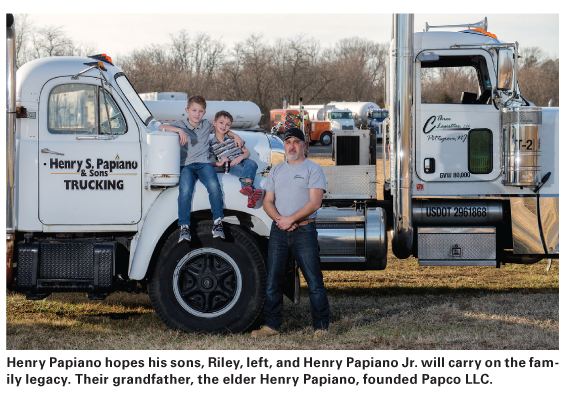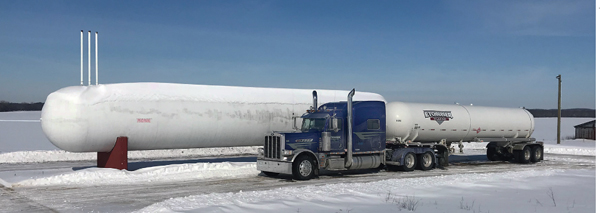(March 19, 2018) — It’s a safe bet that bulk plants were churning faster this past winter compared to the previous two, even absent a stinging Polar Vortex. But there was a new and widely reported storm phenomenon moniker — a bomb cyclone that unleashed freezing blizzard conditions across wide areas. Overall, more sustained wintry cold meant trucks had to roll. Two transportation companies wheeling to meet ramped-up demand were Etchberger Trucking Inc. of Freeport, Ill. and C Three Logistics LLC of Newfield, N.J., both headed by customer-focused, next-generation owners.

Kris Etchberger of Etchberger Trucking and Henry Papiano of C Three Logistics founded their common carrier operations in recent years, following their fathers into the industry after previously working in the family businesses. Etchberger observes that this was his busiest winter so far and marked his company’s third season hauling propane. “We were the busiest just after Christmas all the way through January and into February,” he says, recounting that federal hours-of-service waivers aided his firm’s efforts to serve customers and mitigated average two- to three-hour terminal loading times and some longer eight- to 12-hour waits.
The cold meant an all-hands effort at Etchberger Trucking, which operates nearly 40 trucks and a terminal in Indianapolis that houses the shop and safety director’s office. That meant Kris, a husband of 19 years and the father of three, was behind the wheel himself much of the time. His brother, Ryan, also works in the business. He says his company started as more of a regional operator, “but now we follow the work.” That took his transports farther afield this heating season, with trips into Tennessee and many into Michigan’s Upper Peninsula. There were also opportunities for East Coast runs. He laments, “We asked for Florida loads but didn’t get any.”
Etchberger adds that the colder heating season brought him many new customers, ranging from mom-and-pops to bigs. “There were many situations where customers needed to be bailed out and reached out to us to supplement their regular transportation providers,” he says. “All my transports were busy. I have more ordered but I won’t get them until June or July. I really could have used them this winter.” He adds that to be successful transportation companies need to be centered on customer service. That means sacrificing time at home when the calls come in and jumping into the driver’s seat yourself when needed.
He recalls that his father, Rich, now retired and whose company hauled livestock and other products — whatever paid — didn’t exactly encourage his entering the transport business. “When I told him I was going to buy my own truck he said it was one of the dumbest decisions I could make. I hauled everything from construction materials to hogs, then stumbled on the tanker thing, beginning with anhydrous. I had six trucks, leased another, and added drivers, but after a year or so that dried up and I had all this equipment.”

Etchberger, forced to look around for other opportunities, determined he needed to own his own refined fuel trailers. In addition to propane, his company hauls lube oils and other products. “In this business doors close and doors open, and sometimes you have to force some open.”
Family Legacy
Many industry veterans undoubtedly recognized a familiar name. Henry Papiano, son of Papco LLC (Vineland, N.J.) founder and longtime transportation operator Henry Papiano, recently launched C Three Logistics with four units and a goal to quickly expand to 10, but in just a short time the company is now operating 40 trucks and transports. The younger Papiano joined his father’s company in 1998 and worked there until the enterprise was sold in 2011.
“I have started my own company based on customer service and being able to provide that family-owned business experience,” he says. “I started last year with four units and am already up to 40. The propane industry is unlike any other, where a handshake still means something and service is not forgotten. I have two sons who I hope one day will take over what I am carrying over, the legacy of Papco in the Northeast.”
He also characterizes this winter as colder and sometimes challenging, with refinery downtime and pipeline allocation in play. However, pulling from Schaefferstown and Marcus Hook, Pa. was not a problem. His trucks did not have to travel farther to Chesapeake, enabling multiple loads to be delivered daily. At press time, demand had slowed as rail deliveries and marketers caught up, he says. “The one thing about this industry is that no customer has a crystal ball. Weather is the key factor and it can’t always be predicted, so the best thing I can provide is customer service, a legacy I’m carrying over from my father.”
The C Three owner comments that he was fortunate to work at a large corporation after his dad sold Papco, which afforded him the opportunity to become steeped in business operations, yet he wanted to operate on his own, as his father had. “Corporate America has a lot to offer, but in our business customers need a person to say something is going to happen, then it does. That is what I am going to bring to the market in the Northeast. I watched my father grow to over 300 units, and with the support of customers pushing me along I have no doubt I will soon be back at that number.”
The married father of three young children notes that even if independents put their own transport units into service, what works in the summer doesn’t always pan out as well in winter. “Common carriers are needed to fill the gaps. I’m fortunate to be able to haul for anybody. Others can’t offer that.” The New Jersey Propane Gas Association member adds that, like his dad’s Papco operation, drivers at C Three don’t get pink slips at the end of the heating season. “We’re fortunate to work with other companies, such as delivering cylinders. We’re also a butane carrier and we haul propylene.”
And what transportation company owner can resist bragging about his trucks. “I went with the [model] 389 Peterbilt, which is a very eye-catching unit that customers appreciate when they have a clean asset pulling into their yard. One hundred percent have electronic logs and we also run dash cameras in all our units.”
—John Needham

